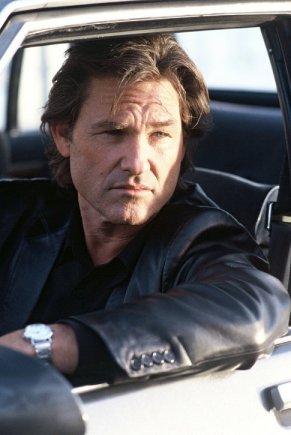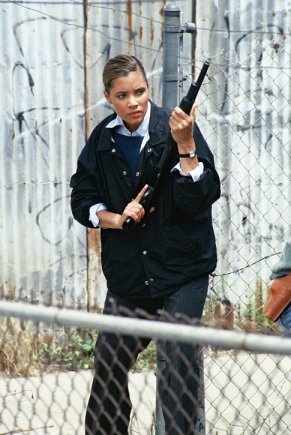|
|
|
"I'd
like an Oscar, please,
and some fries with that."
|
Dark
Blue
Certain
events in American history burn so brightly that they beg
for serious film treatment. Indeed, the Rodney King beating,
police trial, and subsequent riots have echoed in the movies
over the last decade (including last month's National Security),
but until Dark Blue, nobody has directly wrestled with
them. Unfortunately, working in service to box office hopes
and perhaps a star ego, the film grapples weakly then taps
out.
It's
easy to see why star Kurt Russell would be attracted to the
material. Taken from a story by James Ellroy, a poet when
writing about police corruption (especially in the LAPD),
the film places Russell in the last five days before the King
verdicts were announced.
As police
Sgt. Eldon Perry, Russell plays a conflicted crackerjack cop
who does whatever he feels it takes to achieve justice on
the mean streets of L.A. It's a meaty role, driving the film,
and even when it makes little sense, the actor is never less
than compelling.
But Perry
is the only character even remotely approaching complex. Everyone
else in Dark Blue comes straight out of Central Casting,
from his venial supervisors and baby-faced partner, to even
(most disappointingly) Ving Rhames as Perry's potential nemesis,
straight arrow Deputy Chief Holland. Failing the wooden puppet
test, Rhames' main task in this film is to look concerned.
Part
of the problem comes from what a huge event those riots were,
and how large the people involved loomed. Holland's main goal
is to be L.A.'s first black police chief, and quite simply,
we know that didn't happen. (Or rather, not to a man named
Holland.) And somehow, Dark Blue manages to completely
leave out the controversial Chief Daryl F. Gates. If your
knowledge of history comes straight from the movies, you'd
think that Holland succeeded in taking over the LAPD and scouring
the corruption from it.
Director
Ron Shelton and his team try to solve this problem by making
the historical events a backdrop for their story, but they
never strike the right balance. They want us to be aware of
it, as Perry occasionally goes off on self-righteous rants
about how the four cops on trial were just following procedure.
He also prophesies the riots themselves to both his wife (Lolita
Davidovich) and his bumbling partner Bobby Keough (Scott Speedman).
Mostly,
though, we're to follow Perry's awakening to his own corruption
as he tracks down two killers who held up a Korean grocery
store. Though he immediately figures it out, he is ordered
by his boss (and Bobby's uncle) Jack Van Meter (Brendan Gleeson)
to look elsewhere. Why? Because the heist was done at Van
Meter's request; the two idiot crooks give him the lion's
share of the take from their crimes.
For some
reason, it takes Perry forever to figure that much out. At
least the film respects us enough to not hide the mastermind's
identity, sparing us one bad plot twist. When it does all
come to a head, though, every single player has been telegraphed
straight out of the Dirty Harry series, but with the
bonus of the incredibly hot Michael Michele calling Russell
evil, just in case we hadn't figured it out.
|
|
|
Michael
Michele: Hot, talented
and probably wishing she hadn't left ER
right
about now.
|
Yes,
Perry drinks, he possibly womanizes (we never know for sure),
and he does terrible things in order to make the streets of
L.A. safe. But evil? Proving that the divide between Ellroy
and this bastardization of his work is a great one, the film
never has the courage to even entertain the notion that maybe
his actions really are necessary. It's as if someone
saw an episode of The Shield and sent a memo: "well,
we can't have that."
Even
when going into the war zone of the riots, the mob ends up
doing justice for Perry, in a distasteful steal of an indelible
image from the actual time. In real life, the white man who
got his head bashed in with a cinderblock was an innocent
man who happened to be in the unexpectedly wrong place at
the wrong time. Here, he got what he deserved. If I spoiled
something for you, I apologize, but the moment sickened me.
In its effort to take a high moral stance, Dark Blue
proves morally bankrupt.
Not that
I agree with Perry's methods. In this kind of film, you should
be able to understand that he deserves a fall. But Dark
Blue neatly divides the police into Caucasians and ethnics.
Every white cop is corrupt. Only Speedman's love of the African-American
Michele allows him some semblance of redemption. (Though,
to be fair, the "real killers" are an interracial team with
no apparent prejudices against anyone but white police. They're
equal opportunity a-holes.)
The Rodney
King case remains controversial, and maybe we the public will
never really know the truth. By setting the film against it,
the filmmakers also get to pay homage to post-9/11 attitudes,
that the cops are all good guys now.
But you
know what? Then and now, they're still men and women. Some
are strong; some are weak. Most do good, and some do bad things,
regardless of their backgrounds. Dark Blue tries to
reduce a case some see as black vs. white to simple black
and white. And it just doesn't work that way.
Despite
Russell's strong performance, this may be the worst film of
the year. All the more heart-breaking, because it has such
good intentions.
What's
it worth? $2
|







